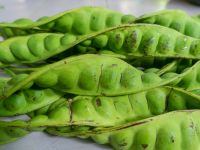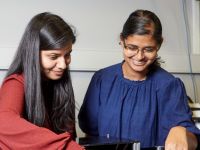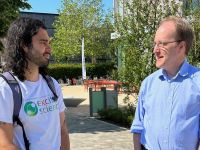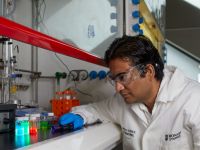
Member profile: Jochen Feldmann
There is a proud tradition of independent thinking at Ludwig-Maximilians-Universität, where Professor Jochen Feldmann is upholding the example once set by Nobel Prize winner Max van Laue.
In 1914, Laue received the prestigious Nobel Prize in Physics for his discovery of the diffraction of X-rays by crystals.
He made the breakthrough despite being discouraged from attempting it by more senior members of the faculty at LMU.
It’s a lesson that Jochen, an Exciton Science Associate Investigator, continues to carry with him, particularly as he approaches the culmination of an impactful career in modern physics.
“Max von Laue was suggesting this experiment to very well-known professors and they were both telling him that it's not possible to do that experiment because atoms are shaking around, and so there will be no diffraction pattern of X-rays,” Jochen said.
“Against this advice, together with others, he did the experiment and succeeded. In a way, it shows that it's very hard to foresee the future in science, and with this kind of intuition, even against experience, at the end, one has to try the experiment.”
Building on the pioneering work conducted by Laue and many other German physicists of the late 19th and early 20th centuries, Jochen’s career and contemporary work has been focused on semiconductors, particularly through the lens of advanced photovoltacis applications.
“My group is working on time-resolved optical spectroscopy for nanomaterials,” he said.
“And the main issue is to understand what photoexcited electrons and holes, which together make an exciton, are doing before they recombine and vanish again.
“These processes are involved in many devices like solar cells, LEDs, and lasers. What we learned from optical spectroscopy has direct consequences for changing the set-up or composition of devices. But our goal is always trying to [improve] our understanding of optical properties.
Reflecting on his career during a visit by members of Exciton to Science to LMU in 2023, Jochen identified working with students as the most rewarding aspect of his role.
“I think at the end, what I notice is that the best thing of all that I've done is scientific work with young people, which is always very refreshing, and to notice how much energy they have and how much fascination they have.
“And even talking about very difficult tasks or experiments where I would say maybe this will not work, they are always very optimistic and they mostly get it done. So I'm always impressed and it makes me happy. That's a wonderful job.”
Perhaps with the cautionary tale of Laue’s doubtful superiors in mind, Jochen is always open to being challenged on his expertise by dynamic young researchers.
“I have my ideas and suggestions and then the best students come back and say, ‘I know I have something better and why don't we try this and that after a while?’ And I've learned to listen to this,” he said.
“It's a collaboration between young people and me and other people. And that's the beauty of it, to collaborate between different ages. Also, there's people from different countries, there's different education histories. That all adds up to success.”







